22 Jun 2022 | News and features, Statements, United Kingdom
Today, the UK Government presented its new Bill of Rights before Parliament, claiming that it will “restore a proper balance between the rights of individuals, personal responsibility and the wider public interest”. In reality, the new Bill will undermine the universality of all human rights and weaken the ability of courts to give effect to protection of fundamental human rights, including freedom of expression. It will expand state power and hamper efforts to hold the Government to account, joining other legislative measures – such as the Judicial Review and Courts Act 2022 – that have reduced the ability to challenge government overreach.
The Bill is set to replace the Human Rights Act, which has protected human rights and the freedom of expression of people living in the UK for over twenty years.
The Government claims that replacing the Human Rights Act with a new Bill of Rights will strengthen freedom of expression. As human rights organisations that promote and defend the right to freedom of expression worldwide, we unequivocally reject this false narrative. Freedom of expression is too important to be used as cover for weakening the protection of human rights. On the contrary, as detailed in our joint consultation response, the Human Rights Act has bolstered free expression in the UK in a number of areas: strengthened defamation law; enhanced protection of journalistic sources and material; strengthened protection of the right to protest; and restricted perception-based recording of non-crime incidents, among other things.
ARTICLE 19, Index on Censorship and English PEN believe that if the Government is serious about its purported goal to strengthen freedom of expression in the UK, it should instead focus its attention on reforming a number of problematic laws and legislative proposals it has brought forward, including the National Security Bill, the Online Safety Bill, the Higher Education (Freedom of Speech) Bill, the Public Order Bill, and the Police, Crime, Sentencing and Courts Act.

Deputy Prime Minister and Justice Secretary Dominic Raab. Photo: Joe Giddens/PA Wire/PA Images
We urge the Government to abandon any proposal that would replace or weaken the Human Rights Act in any way. Moreover, it must follow the normal procedures for introducing new law – particularly a bill that could have such sweeping repercussions – and allow for proper, thorough democratic scrutiny of the bill. Rushing through such legislation could put the protection of human rights of the people in the UK at risk and fail to offer the levels of protection to which they are entitled, and which the Human Rights Act has already enshrined in law. One of the justifications for the Bill of Rights is to give greater weight to the views of elected lawmakers. By reducing the opportunity for these same lawmakers to scrutinise the Bill, it demonstrates the hollow commitment to democracy and the rule of law that underpins this Bill.
In the letter to Justice Secretary, Dominic Raab, this month, our organisations were among a coalition of 150 organisations from across civil society that called on the Government to provide pre-legislative scrutiny of the proposed Bill of Rights. We warned that the proposal to repeal and replace the Human Rights Act would be a significant constitutional reform, which requires careful and robust consideration. The rights of individuals could be compromised if such a process was hurried.
20 May 2022 | Belarus, Media Freedom, News and features, Russia, Ukraine
The free press in Belarus is under threat like never before in the wake of the disputed re-election of Aleksandr Lukanshenka in August 2020, with journalists being threatened, fined, arrested and tortured for speaking out against the country’s ruler. Indeed, former Index employee and contributor Andrei Aliksandrau remains in prison, facing a sentence of up to 15 years for alleged “high treason”.
A year after the elections, the Belarusian authorities went a step further in clamping down on media freedom, banning the country’s journalism body, the Belarusian Association of Journalists.
Despite the challenges, the BAJ continues to receive support and, at the end of April, the organisation was awarded the 2022 UNESCO/Guillermo Cano World Press Freedom Prize.
Index spoke with BAJ chair Andrei Bastunets in the wake of the award, talking about the worsening situation for independent media and how BAJ continues to support press freedom.
Is it still possible to work as an independent journalist in Belarus following the start of the war in Ukraine?
“The key problems for Belarusian independent journalists arose before the war in Ukraine, and even before the 2020 presidential election. But after the elections – and journalists’ coverage of post-election protests – the pressure on the media, journalists and bloggers has increased dramatically (although earlier Belarus had bad ranking positions in international free speech ratings and indexes too). In 2021, many journalists and even entire editorial offices were forced to flee the country in order to avoid criminal prosecution by the Belarusian authorities and to be able to continue their professional activities.”
“A lot of Belarusian journalists – more than 100 – who were forced to leave their country chose Ukraine as a place of refuge. But after the start of the Kremlin’s war against this country, they had to leave their homes and belongings again and move to other countries. Journalists and bloggers who continue to work in Belarus face additional persecution for expressing their anti-war position. However they spread truthful information on what is happening. Last week, Baranavichy-based journalist Yury Hantsarevich was detained and accused of passing on information about Russian troop transfers in Belarus.”
How many journalists are still in detention in Belarus?
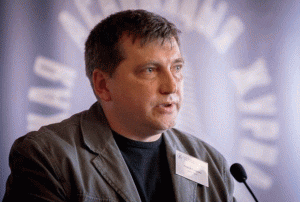
Andrei Bastunets, chairperson of the Belarusian Association of Journalists
“There are 24 journalists behind bars at the moment. Eight of them are serving their terms in prison, and the rest are in custody pending trial. All are deemed political prisoners by Belarusian human rights organisations.”
“In the first four months of 2022, five sentences were handed down against journalists in criminal cases – from 1.3 to 2.5 years in prison. The maximum punishment for a journalist has been a 15-year strict regime sentence for blogger Ihar Losik, who was a consultant for the Belarusian service of Radio Liberty.”
“My friend and former Index staff member Andrei Aliaksandrau has been in jail since January 2021; and recently the Belarusian Investigative Committee reported on the charges against him under four criminal articles, including Article 356 (high treason) which outlines a punishment of up to 15 years in prison.”
How is the war (or special military operation as Putin would have it) being reported in Belarus?
“There is a difference in the approaches of state-run and independent media outlets. In the news agenda of the independent media, the war in Ukraine is being called ‘war’ and it is on their front pages. These media outlets are publishing mostly online now because they do not have an opportunity to publish in print after printing houses and state monopoly distribution chains were banned from cooperation with the independent press. The state television and other government-backed media in Belarus are reporting on the war in Ukraine spreading the narratives of the Russian pro-Kremlin media.”
Is the BAJ still operating and is it having to do so from exile?
“In August 2021, the Supreme Court of Belarus ordered the dissolution of the organisation, at the request of the country’s Ministry of Justice. Now, BAJ is not an organisation registered by the Ministry, it is not a formal structure. It is about 1,300 people united in implementing their common idea and their mission – to expand the space of free speech in Belarus. And an official’s resolution has not affected our activities. Most of the organisation’s leadership had to leave the country after a series of police raids and interrogations by investigators, after arrests of our colleagues and friends, but we continue our work from abroad. We treat all media outlets of Belarus, regardless of whether they stayed in the country or moved abroad, as a single Belarus media sector. And we are providing all the necessary and possible support to this media sector.”
How important is the recognition through awards of BAJ, such as the Unesco award recently?
“We regard the UNESCO award as support for the entire independent journalistic community in Belarus. By the way, within literally two days, BAJ received three awards. In addition to UNESCO/Guillermo Cano World Press Freedom Prize, there was the award from the Swedish section of Reporters Without Borders (RSF) and Difference Day Honorary Title for Freedom of Expression from Brussels ULB and VUB universities. They are very important for our organisation as appreciation of our work, but even more as a high assessment of Belarusian journalists’ work in extremely difficult conditions. And, of course, it is important for us that Belarus has returned to the front pages of the international media. Although, we understand indeed that current events in Ukraine are attracting general attention as the state of affairs in the region and of the entire system of world security formed after WWII depend on their development.”
16 May 2022 | Awards, Cuba, Fellowship, Fellowship 2022, Palestine, Turkey, Yemen
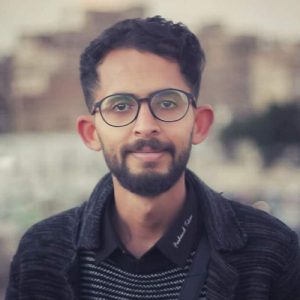 Yemeni artist Thiyazen Al-Alawi uses his craft to shed light on the destructive situation in Yemen through street art campaigns. He hopes to inform the public of what the war has done to his homeland.
Yemeni artist Thiyazen Al-Alawi uses his craft to shed light on the destructive situation in Yemen through street art campaigns. He hopes to inform the public of what the war has done to his homeland.
First inspired by the Arab Spring in 2011 as a teenager, Thiyazen turned to art as a form of self expression, launching his first street art campaign in 2012 as the war began. As conflict invaded every aspect of Yemeni life, he decided “every artwork is proof of their existence and continuity in life…something that gives people hope.” Thiyazen’s work aims to reflect the ugliest and truest forms of war, and its effect on real people.
Thiyazen’s latest project is a collaboration with British artist Luc Waring titled “Letters from Yemen”, a series of drawings and letters from conversations between the two about art, peace, war, and the horrors Thiyazen has witnessed himself. Inspired by a saying Thiyazen heard in his youth, the walls must do the talking when the newspapers are silent; the compiled writings and portraits raise awareness about the war in Yemen with a sensitivity and humanity only an artist and their medium can produce, eventually gaining traction and attention by the public. Due to the ongoing occupation by the Houthi militia, Thiyazen is risking his own safety as he continues to produce art.
Thiyazen continues his work on long-term projects with the Swiss Arts Council to spread awareness about the conditions in Yemen. He also contributes to the “Yemen Peace Forum” with the Sana’a Center for Strategic Studies, writing articles and studies like “Art and Youth in Yemen” in the Journal of Transitional Justice of the University of Oxford. “I feel that I must tell the truth no matter what,” Thiyazen explains,” I could sacrifice my life for the truth. And nothing will stop me.”
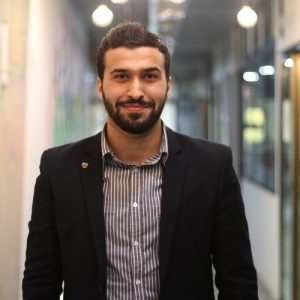 Moe Moussa is a journalist, podcaster, poet, and the founder of the Gaza Poet Society. He uses various forums and mediums to amplify the voices of Palestinians.
Moe Moussa is a journalist, podcaster, poet, and the founder of the Gaza Poet Society. He uses various forums and mediums to amplify the voices of Palestinians.
Moe began his career as a translator for international journalists in 2014. He was soon inspired to speak about the situation from his own perspective. Studying English literature in college and growing up around poetry, it was only fitting that Moe decided to use his art to bring the individual lives of people in Gaza to the international audience.
Delving into Palestinian poetry led Moe to connect online with poets all over the world. He was interested in using his skills as a poet and a journalist to share the stories of individual lives with a global audience. After realising the lack of opportunities for poets to share their work in Arabic and English, he created a space to offer an opportunity for young people to speak and find their own voice in 2018 – the Gaza Poet Society. The organisation is supported solely by donations from international poets who believe in Moe’s cause. He is at constant risk of Hamas censorship and at the will of the Gazan government to approve of civilian movement out of the country.
Watching his family go days without water, power, and freedom of movement, Moe temporarily left Gaza for Istanbul in 2021 to continue his work more effectively. He was awarded the Times Richard Beeston Bursary in 2019 and has plans to complete his fellowship in London in 2022 following delays due to the pandemic. As the creator and host of the podcast “Gaza Guy”, he is focused on amplifying the voices of young Palestinians through poetry and fights for access to education in Gaza. Additionally, Moe has contributed to We Are Not Numbers, a site publishing stories of Palestiniain youth experiencing war. Moe recently released his debut poetry collection titled “Flamingo” and is working freelance to support the Gaza Poet Society from abroad.
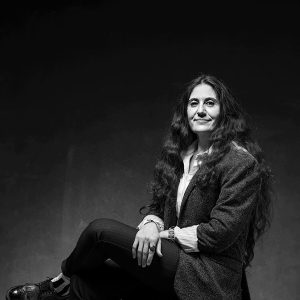 Fatoş İrwen is a Kurdish artist and teacher from Diyarbakır, Turkey working with a variety of materials and techniques.
Fatoş İrwen is a Kurdish artist and teacher from Diyarbakır, Turkey working with a variety of materials and techniques.
İrwen regularly uses her art to document her experiences as a Kurdish woman living in Turkey. The performance piece Füg [Fugue, 2012] documented her first experiences in police custody where she was physically and sexually abused. In 2016 İrwen was again taken into custody while boarding a domestic flight. She was charged with “resisting the police, opposition to the law against demonstrations and assemblies, propaganda for a terrorist organisation, belonging to a terrorist organisation” and sentenced to 3 years, 1 month and 15 days in prison. The charges related to a peaceful protest in 2013.
During her imprisonment, İrwen made 1,500 works of art using materials accessible to her, including hair, tea, food, shoe polish, old textbooks and newspapers, bed sheets, laundry pegs, scarves, and mould and cigarette ashes. Among other projects, the 2019 piece titled “Gülleler” (Cannonballs) features balls crafted from the hair of inmates participating in a hunger strike. “The hunger strike was like firing a shot to the outside world,” İrwen says. After being released, İrwen collected her art pieces in her first solo exhibition titled Exceptional times which was featured at Depo in Istanbul in 2021.
Discussing censorship by the Turkish authorities, İrwen says “this issue still continues to be the most painful issue of our lives and for which we pay a heavy price.” She is deeply committed to fighting for freedom of expression and artistic freedom.
Due to her challenges with Turkish authorities and her identity as a Kurdish woman, İrwen has found that galleries and art spaces are sometimes reluctant to feature her work. Still, she has found success, and her work has been exhibited in Iran, Germany, Austria, Hong Kong, Iceland, France, Mexico, Iran, Morocco, Sweden, and Turkey.
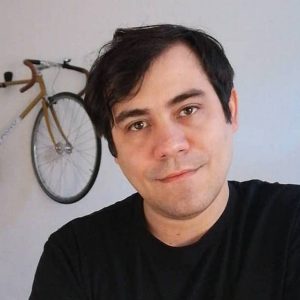 Hamlet Lavastida has been described as a political activist by way of art. Lavastida uses his art to document human rights abuses in Cuba and to criticise Cuban authorities.
Hamlet Lavastida has been described as a political activist by way of art. Lavastida uses his art to document human rights abuses in Cuba and to criticise Cuban authorities.
Lavastida pushes boundaries of censorship in Cuba and highlights the distinctly Cuban spirit of cultural resistance. His work reconstructs old Cuban political and military propaganda.
Throughout his career, Lavastida has sought to use his art to fight for transparency and freedom of speech in order to fight against the Cuban government. He sees his art as a non-violent tool to fight against the current regime. Lavastida has been involved in various protest movements in Cuba, including the 27N movement which grew out of the protests held on 27 November 2020. The movement works to bring attention to the censorship of artistic expressions in Cuba.
In June 2021, Lavastida was arrested after returning from a residency at the Künstlerhaus Bethanien in Berlin. He was accused of ‘incitement to commit a crime’ because he suggested that other artists stamp images related to the San Isidro and 27N movements on local currency. Following his arrest, Amnesty International named him as a ‘prisoner of conscience’. Lavastida stayed in prison for 87 days. He was finally released without charges.
Lavastida has been living in exile in Europe since September 2021. He has been warned that he will be arrested immediately if he ever tries to return to Cuba. Lavastida is deeply concerned by the situation. While has experienced threats and censorship targeting his art throughout his career, he is now experiencing threats against him as an individual. He believes this is part of a greater trend of censorship in Cuba.
Lavastida plans to continue creating art and speaking up about the situation in Cuba.
4 May 2022 | News and features, United Kingdom
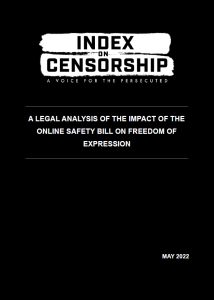 The Online Safety Bill has simple, laudable aims – to make the online sphere more safe. But despite almost seven years of debate, thousands of hours of Parliamentary scrutiny, analysis from civil society, business and the media, there is still significant uncertainty about how the Bill will work in practice. The Government is still not able to define terms at the heart of the legislation such as “legal but harmful” or give the as many as 180,000 technology companies big and small who will implement this new legal framework clear guidance on how this landmark legislation should operate.
The Online Safety Bill has simple, laudable aims – to make the online sphere more safe. But despite almost seven years of debate, thousands of hours of Parliamentary scrutiny, analysis from civil society, business and the media, there is still significant uncertainty about how the Bill will work in practice. The Government is still not able to define terms at the heart of the legislation such as “legal but harmful” or give the as many as 180,000 technology companies big and small who will implement this new legal framework clear guidance on how this landmark legislation should operate.
To fill this gap and help explain what the Bill will mean in practice, the Legal to Say Legal to Type campaign has instructed media law expert Gavin Millar QC of Matrix Chambers to produce the first analysis of the implications of the Online Safety Bill on UK citizens’ freedom of speech.
The QC’s opinion explains and analyses the broad implications of the Government’s new online safety regime against current freedom of expression laws and found that the Bill will significantly curtail freedom of expression in a way that has profound consequences for the British media and journalism, courts and the UK’s digital economy. The Bill gives the Secretary of State overseeing the legislation unprecedented powers to curtail freedom of expression with limited parliamentary scrutiny.
The Bill, which received a second reading in Parliament on 19 April, does not comply with Article 10 of the European Convention on Human Rights, and far from the claim of the Culture Secretary that the Bill will protect free speech it actively undermines existing legal protections in an unprecedented manner. This new analysis shows how the Online Safety Bill as currently drafted ends the historic principle in law that people can publish what they like, unless the state specifically and clearly passes laws to the contrary.
This report is not a comprehensive dissection of the flaws in the Bill which are too vast to deal with succinctly. For example, the UK Independent Reviewer of Terrorism Legislation, Jonathan Hall QC has recently publicly criticised the Bill as being “ineffective on terrorism”. The chief criticism he lays is that “the Bill defines ‘terrorism content’ by reference to terrorism legislation, but ignores intention and defences. This leads to some very odd outcomes. It’s hard to see how it provides a workable framework for regulation.”
The ambiguity of the drafting and the lack of governmental consideration on the Bill’s intersection with existing linked areas of law is indeed staggering. The idea that speech can be lawfully moderated without properly adjudicating on an individual’s intention and the context of the speech is nonsensical – irrespective of whether your concern is terrorism, crime or freedom of expression.
Index on Censorship believes that the consequences of the Bill (intended and unintended) go beyond what has been considered in Parliament to date, for example:
- The Bill violates freedom of speech as defined in UK and international law.
- Protections for media content are not as wide as existing human rights for journalists
- Pro-active state-enforced censorship by algorithm has questionable legality.
- New powers for platforms such as Meta, Twitter, and even companies like Apple, will mean they may be performing functions of a public nature under the “Duty of Care” and could be subject to judicial review.
- The Secretary of State for Digital, Culture, Media and Sport will have an unparalleled ability to censor.
- The proposal to proactively monitor private communications lack safeguards for journalistic or legally privileged material.
The Government has ended up in this position having disregarded all the learnings from regulation of the online space over the last twenty years, including some of the fundamental building blocks of the internet namely intermediate liability protections. This is despite pre-legislative scrutiny identifying flaws in the draft Bill.
In summary, the legal advice, published in full in this report, found:
- The regime proposed by the Bill does not contain the statutory safeguards that would be required to prevent or limit the risk of violations of the right to freedom of expression.
- The structure of regulation offers no prospect of ‘fact-specific’ adjudications on speech.
- Harmful speech has no legal basis and risks restrictions on speech that are too broad and therefore open to abuse through selective enforcement.
- On the face of the Bill there appears to be a risk that platforms, and possibly Ofcom, may access confidential journalistic material in carrying out their statutory functions.
- ‘Democratic importance’ protections are not as wide as existing human rights protections as they only cover a limited form of political expression.
The report is available to read in full below or to download here.



 Yemeni artist Thiyazen Al-Alawi uses his craft to shed light on the destructive situation in Yemen through street art campaigns. He hopes to inform the public of what the war has done to his homeland.
Yemeni artist Thiyazen Al-Alawi uses his craft to shed light on the destructive situation in Yemen through street art campaigns. He hopes to inform the public of what the war has done to his homeland. Moe Moussa is a journalist, podcaster, poet, and the founder of the Gaza Poet Society. He uses various forums and mediums to amplify the voices of Palestinians.
Moe Moussa is a journalist, podcaster, poet, and the founder of the Gaza Poet Society. He uses various forums and mediums to amplify the voices of Palestinians. Fatoş İrwen is a Kurdish artist and teacher from Diyarbakır, Turkey working with a variety of materials and techniques.
Fatoş İrwen is a Kurdish artist and teacher from Diyarbakır, Turkey working with a variety of materials and techniques. Hamlet Lavastida has been described as a political activist by way of art. Lavastida uses his art to document human rights abuses in Cuba and to criticise Cuban authorities.
Hamlet Lavastida has been described as a political activist by way of art. Lavastida uses his art to document human rights abuses in Cuba and to criticise Cuban authorities.